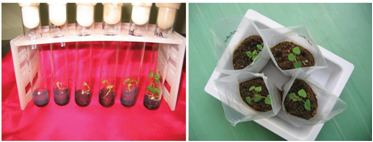
Technology Description
- During wide hybridization in plant breeding, crosses often do not result in hybrid plants because of embryo abortion.
- Using in vitro breeding techniques like hybrid embryo rescue, it is possible to save such crosses and develop hybrids not otherwise possible.
- It is thus a boon to the breeder and is attractive as a non-GM biotechnology for introducing desired genes in a crop/variety.
We have demonstrated this in
- Fruit crops (seedless grape, seedless lime, mango, papaya, banana) &
- Vegetable crops (capsicum, onion, tomato and brinjal)
Products and By- products
- New hybrids and genetic combinations of crop genotypes possible that conventional breeding cannot provide
Technology Benefits
- Successful in incompatible / interspecific / intergeneric crosses; also useful in crosses where immature fruit-drop is very high
- Seedless crops, eg., Thompson Seedless grape, can be used (even as the female parent)
- A practical alternative to GM crops; attracts no opposition
Target segment /End User Profile
- Private companies involved in commercial breeding of horticultural crops
This technology can be applied to any crop and Joint Venture can be entered into with companies desiring specific cross-combinations
Market potential
- Penetration of niche markets (since such hybrids cannot be developed conventionally)
Investment Required
- Existing R&D tissue culture laboratories housed with the seed companies can use this technology without any additional infrastructure cost.
Expected Returns/Profit
- The technology is cross/crop specific.
- For example:In Thompson Seedless grape, Downy Mildew disease can cause 100% crop-loss. A resistant hybrid developed through embryo rescue would give 100% success as against zero success in traditional breeding.Similarly, in brinjal, when Solanum macrocarpon is used as a parent for developing resistance to shoot & fruit borer, hybrids cannot be generated conventionally. But, this is possible through embryo rescue, a knowledge and skill-intensive technology. Such approaches are an alternative solution to GM foods like Bt brinjal, etc.
